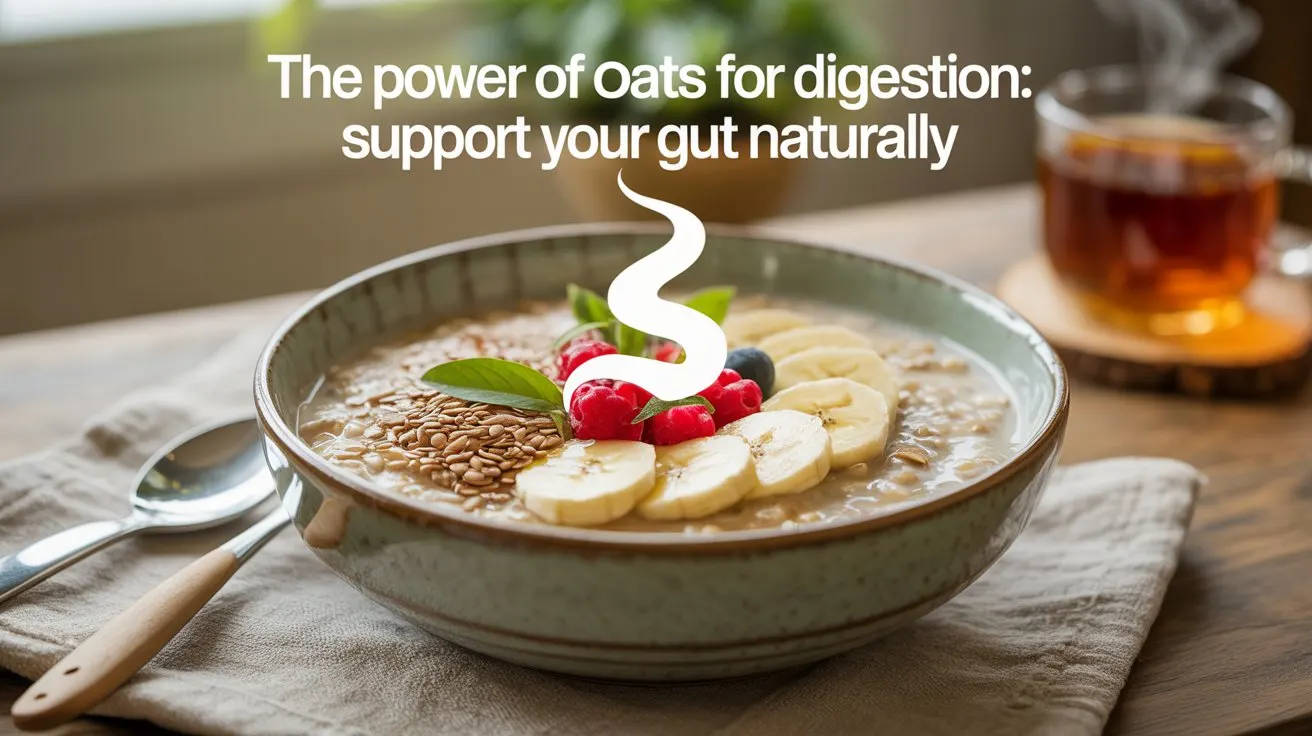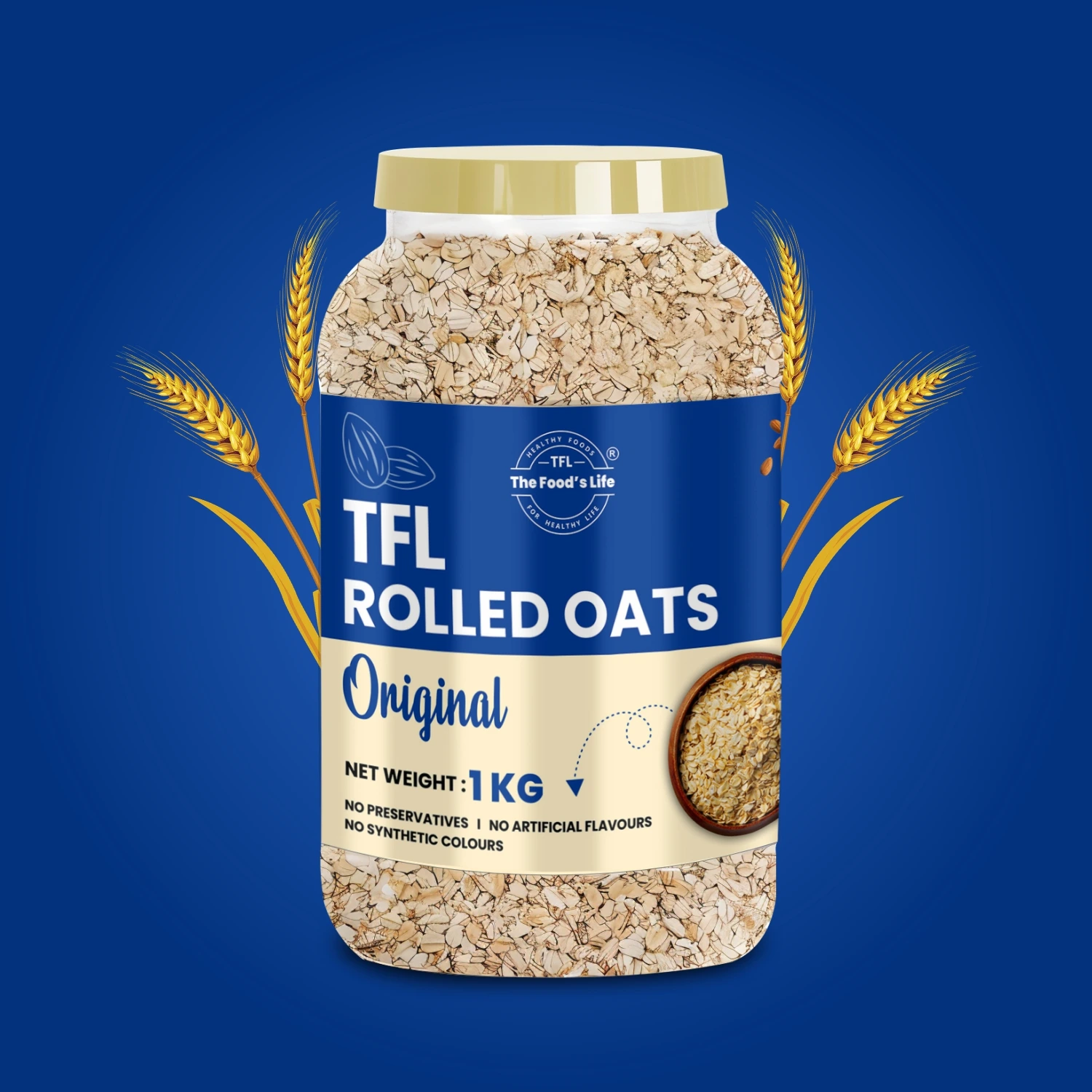Oats are loaded with soluble fiber, mainly beta-glucan, which automatically slows digestion and helps regulate bowel movements. This makes oats for digestion a perfect daily food for anyone looking for a remedy for agency or bloating.
Of all the grains, oatmeal is one of the best for the gut because it nourishes healthy gut bacteria, is a prebiotic, and provides sustained energy without overstuffing.
The best oats for digestion are the least processed oats, like steel-cut or rolled oats, as they maintain whole grain fiber, making them suitable for digesting oats slowly and uniformly.
Whether breakfast bowls, smoothies, or the like, oats provide balanced, consistent support for the gut—helping you feel lighter, healthier, and more in balance every day.
Introduction – Why Oats for Digestion Are Essential
When it comes to gut health, oats for digestion are some of the easiest and most effective natural options! Oats are easy on the stomach, abundant in fiber, and can be used in almost every meal. For this reason, if you want food that helps with regularity, promotes comfort, and provides food for the gut lining, oats are a trusted source of digestive health.
What makes oats a top food for gut wellness
- High in Soluble Fiber: Oats are very high in soluble fiber or beta-glucan. This means beta-glucan absorbs water and create a gel-like form in the digestive tract. Consequently, this slows digestion and provides a feeling of fullness, whilst helping you have regular bowel movements.
- Easy on the Stomach: Whether you love steel-cut oats, rolled oats or instant oats, oats are naturally very easy to digest. Once prepared oats are soft and suitable for anyone with a sensitive stomach or recovering from illness.
- Prebiotic: Oats can be described as prebiotic. When you eat oats, you are feeding the healthy bacteria in the gut. This results in a stronger microbiome overall, increased nutrient absorption, and better immune response.
Soluble fiber’s role in digestion
- Beta-Glucan and Motion: The soluble fiber in oats slows digested food through the digestive tract which improves nutrient absorption and stabilizes blood sugar by providing a smoother digestive experience.
- Cholesterol Management: A benefit of eating oats for digestive health is that the same properties that can help your digestion lowers the LDL or bad cholesterol which can help promote heart health.
- Constipation: Soluble fiber can soften stool which makes it easier to pass. Regularly eating good amounts of oats can be a soft gentle way to help those suffering from occasional constipation.
Oatmeal good for gut health and daily comfort
- Nutrition Daily Gut Simplicity: Starting your day with breakfast oatmeal supportive of gut health provides the Asupport of the digestive tract. If you choose to sprinkle chia seeds, banana or probiotic yogurt on your bowl of oats to receive even greater gut health benefits.
- Health For All Ages: Oatmeal is a budget friendly, highly nutritious option for students, adults and seniors alike that is easy to digest, and serves every single part of your gastro intestinal tract.
- Gut Anti-Inflammatory: Chronic gut inflammation could greatly appreciate a diet high in oats due to their ability to provide anti-inflammatory and antioxidant properties.
What Makes the Best Oats for Digestion
Oats are often praised as one of the most effective foods for digestive wellness. But when it comes to choosing the best oats for digestion, understanding the differences between oat types and how they affect your gut is essential. From their fiber content to how they're processed, certain forms of oats offer superior digestive support. Let’s break down what really makes oats a top-tier digestive superfood.
Steel-cut vs rolled oats: which aids digestion more?
Steel-Cut Oats
- These are oat groats chopped into dense, chewy pieces. They are minimally processed and have a lower glycemic index, which means they digest slowly and provide a sustained energy release.
- Their texture encourages more thorough chewing, which starts the digestive process earlier and promotes satiety.
- Due to their density and intact bran layers, steel-cut oats contain higher amounts of insoluble fiber, which helps keep things moving through the digestive tract.
Rolled Oats (Old-Fashioned Oats)
- These are oat groats that are steamed and rolled flat. They are quicker to cook than steel-cut oats while still offering a high amount of fiber.
- Rolled oats contain a balanced mix of soluble and insoluble fiber, supporting gut bacteria and promoting regular bowel movements.
- They're gentle on the stomach, making them great for people with sensitive digestive systems or those recovering from digestive issues.
Summary: Both types are excellent oats for digestion, but steel-cut oats are ideal for people who need more bulk and time-released energy, while rolled oats are better for gentle, daily use.
Benefits of oat bran in digestive support
Oat Bran is often overlooked but may be the secret weapon when it comes to digesting oats:
- It contains more fiber per gram than steel-cut or rolled oats, particularly beta-glucan, a soluble fiber known to:
- Soften stool
- Improve bowel regularity
- Reduce intestinal inflammation
- Beta-glucan also acts as a prebiotic, feeding beneficial bacteria in the gut and helping maintain a healthy gut microbiome.
- Because oat bran is a byproduct of the outer oat husk, it’s more concentrated in fiber, which helps prevent constipation and reduces bloating.
Choosing whole grain oats for gut-friendly nutrition
To ensure you’re getting the full digestive benefit, whole grain oats should always be your go-to:
- Whole oats retain the bran and germ layers, which are rich in antioxidants, fiber, and essential nutrients.
- Eating whole oats supports a healthy gut lining and reduces inflammation, making oatmeal good for gut healing and protection.
- Whole grain oats are also slower to digest, meaning they offer:
- Better blood sugar control
- Long-lasting fullness
- Lower chances of gut distress or glucose spikes
Avoid overly processed oats like instant oatmeal, which often has less fiber and added sugars that can disrupt digestive balance.
How Digestion of Oats Works in Your Body
Oats are one of the most gut-friendly foods you can include in your daily diet. Rich in soluble fiber, vitamins, and minerals, they play a powerful role in maintaining digestive regularity and promoting a healthy gut microbiome. Let’s explore how the process of digesting oats works in your body and why they are considered the best oats for digestion and overall gut health.
Digesting oats: soluble fiber and gut motility
- The key component that makes oats for digestion so effective is soluble fiber, especially beta-glucan.
- When you eat oats, the soluble fiber absorbs water in your digestive tract and forms a thick, gel-like substance.
- This gel slows the movement of food through the stomach and small intestine, improving nutrient absorption and promoting satiety.
At the same time, this fiber adds bulk and softness to stool, making bowel movements more regular and easier to pass.
Oat beta‑glucan slows digestion for steady energy
The beta-glucan in oats doesn’t just support digestion—it also slows the breakdown of carbohydrates in the gut.This slow digestion leads to a gradual release of glucose into the bloodstream, preventing spikes and crashes in energy.
As a result, oatmeal provides steady energy over several hours, which is great for those with blood sugar issues or those trying to manage their appetite.
Prebiotic effects: feeding your healthy bacteria
Oats act as a prebiotic, which means they feed the good bacteria already living in your gut.
The beta-glucan and other fibers in oats aren’t fully digested in the stomach or small intestine—they reach the colon, where they serve as food for beneficial gut microbes.
These microbes produce short-chain fatty acids (SCFAs), such as butyrate, which:
- Reduce gut inflammation
- Strengthen the intestinal wall
- Improve immune response
The Science Behind Oatmeal Good for Gut Function
Oats have earned their reputation as a gut-healthy superfood for good reason. Backed by extensive research, the components in oats—especially their fiber and plant compounds—promote a balanced digestive system. Let’s explore the scientific evidence behind why oatmeal is so effective for gut health and why it’s widely recommended as one of the best oats for digestion.
Studies proving oats’ role in reducing constipation
- Numerous clinical studies have shown that regular intake of oats improves bowel regularity, especially in adults and the elderly.
- The soluble fiber beta-glucan found in oats absorbs water in the intestines, forming a gel-like consistency that softens stool and promotes easier elimination.
- In a study published in the Journal of Nutrition and Metabolism, adults consuming oat bran daily experienced significant improvements in stool frequency and consistency, without needing laxatives.
This makes digesting oats a gentle, natural way to manage mild to moderate constipation—especially in people with low-fiber diets.
Oatmeal’s impact on gut microbiome diversity
- One of the most promising areas of research shows that oats act as a prebiotic, feeding beneficial gut bacteria.
- Oats, especially whole oats and oat bran, are rich in complex carbohydrates that aren’t digested in the small intestine but instead reach the colon intact.
- In the colon, these compounds nourish microbes like Bifidobacteria and Lactobacilli, helping to increase microbial diversity—a marker of gut health and immune strength.
Research in the British Journal of Nutrition found that consuming oats daily increased the number of beneficial bacteria and reduced potentially harmful species.
Oats and enzyme activity for smoother digestion
- Oats don’t just sit in the stomach—they actively stimulate enzyme production to aid digestion.
- Studies have shown that compounds in oats, including avenanthramides and starches, promote amylase and lipase activity, enzymes responsible for breaking down carbohydrates and fats.
- This means that meals with oats are more efficiently processed, reducing bloating, gas, and digestive discomfort.
The steady breakdown of oat components allows for slow, sustained energy release—an added bonus for those managing blood sugar.
Easy Ways to Use Oats for Digestion Every Day
Oats are incredibly versatile and easy to include in your daily meals, making them one of the most practical foods for supporting your digestive health. From a hearty breakfast to gut-friendly snacks, there are simple, delicious ways to make oats for digestion a regular part of your wellness routine.
Breakfast bowls: oats for digestion and nourishment
- Start your day with a warm bowl of oatmeal good for gut health. Cooked oats are soft, easy on the stomach, and packed with soluble fiber like beta-glucan, which helps regulate bowel movements and improve gut lining health.
- Add gut-friendly toppings like chia seeds, ground flaxseeds, banana, or kefir for extra fiber, prebiotics, and probiotics.
- Choose steel-cut oats or rolled oats over instant varieties for the best oats for digestion, as they are less processed and retain more gut-supporting nutrients.
Overnight oats recipes designed for gentle digestion
- Overnight oats are a no-cook method that allows oats to soak slowly in liquid, making them easier to digest and perfect for sensitive stomachs.
- Soaking helps reduce phytic acid (a compound that can interfere with nutrient absorption), making minerals like iron and zinc more bioavailable.
- Use bases like almond milk or coconut yogurt and add digestion-boosting ingredients such as grated apple, chopped dates, and probiotic-rich yogurt alternatives.
- Recipes combining oats with gut-soothing spices like ginger or turmeric can further help in digesting oats with ease.
Snack bars and blends to maintain gut balance
- Oats aren’t just for breakfast. You can use them in homemade gut-healthy snack bars, oat bites, or energy balls to support consistent digestive wellness throughout the day.
- Combine oats with nuts, seeds, and natural sweeteners like dates or honey for a portable and high-fiber snack.
- These combinations offer a balanced mix of prebiotic fiber and healthy fats, making them ideal for maintaining gut balance and energy between meals.
FAQs
Q1. Are oats for digestion good every day?
Yes, eating oats for digestion daily provides consistent fiber intake, supports regular bowel movements, and nourishes gut health.
Q2. Which are the best oats for digestion?
Steel-cut oats and rolled oats are considered the best oats for digestion because they retain more fiber and nutrients compared to instant oats.
Q3. Is oatmeal good for gut bugs?
Absolutely! Oatmeal is good for gut health as it contains beta-glucan, a prebiotic fiber that feeds healthy gut bacteria.
Q4. Can I eat oats if I have IBS or sensitive digestion?
Yes, but start with small portions of digesting oats like overnight oats or soft-cooked oatmeal, which are gentle on the stomach and easier to tolerate.
Q5. Do oats cause bloating?
Oats are generally well-tolerated, but in some cases, a sudden increase in fiber can lead to temporary bloating. Gradually introducing oats for digestion can help your gut adjust.
Conclusion – Embrace the Power of Oats for Digestion
If there’s one simple food that can make a remarkable difference in your gut health, it’s oats. Backed by science and trusted by generations, oats for digestion offer a natural, effective way to support your entire digestive system—day after day.
Why daily oats are a simple path to gut health
Incorporating oats for digestion into your daily meals is one of the easiest and most effective ways to support your gut health. Oats are naturally rich in soluble fiber, especially beta-glucan, which acts like a gentle broom through your intestines—keeping things moving, reducing inflammation, and nourishing your gut lining.
Whether you enjoy them as classic porridge, overnight oats, or blended into smoothies, oats are a convenient, affordable, and versatile staple that improves digestive regularity. The best oats for digestion are whole and minimally processed types such as steel-cut or rolled oats, as they retain the most fiber and nutritional content.
One bowl a day can transform your digestion
You don’t need to make major dietary changes to feel the benefits of oats. Just one bowl of oatmeal good for gut health can:
- Improve bowel regularity
- Reduce bloating
- Nourish your gut microbiome
- Provide slow-digesting energy
- Keep you feeling fuller for longer
By consistently digesting oats, your body adapts and reaps the rewards—reduced discomfort, better metabolism, and a stronger immune system due to the gut-health connection.
Start now with your favorite oat recipe and feel the benefits
Start with whatever oat recipe suits your lifestyle—warm oatmeal topped with fruits and seeds, overnight oats prepared the night before, or simple snack bars made with oat flour. All of these help kickstart and support oats for digestion.
Remember, the best oats for digestion are the ones you enjoy and eat regularly. Whether it's breakfast, a snack, or even dinner, oats make gut-friendly eating both delicious and doable.






